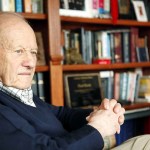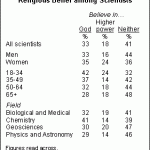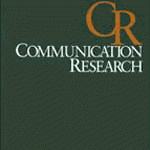New Atheism
In 2007, I called attention to a Point of Inquiry interview with philosopher Paul Kurtz in which he expressed concern over the direction of the New Atheist movement while asserting the commonly shared values between secular humanists and many world religions. Kurtz at the time was not the only prominent humanist to voice such concern, as Philip Kitcher in a POI interview expressed dismay over the "unremittingly negative" rhetoric of New Atheist authors.
The interview was one of the first volleys in an ever louder critique by Kurtz of the New Atheist movement, affirmed earlier this month in…
Now that Richard Dawkins has a new book out intended to introduce evolutionary science to a wider audience, is he re-framing his message on science and religion to allow for accommodation? It's too early to say based only on comments made during an interview at Newsweek. Josh Rosenau has the details and a discussion.
One of the overlooked findings of the Pew survey of U.S.-based scientists is that roughly 51% say that they either believe in God (33%) or a higher power (18%) and roughly 30% self-identify as Protestant (20%) or Catholic (10%). The findings cut against a commonly voiced claim by many outspoken atheists that scientists are overwhelmingly non-religious and that a scientific worldview is incompatible with religious belief.
In addition, among the sample of AAAS members surveyed, roughly 2/3 of scientists ages 18-34 say that they believe in God (42%) or a higher power (24%). This is in sharp…
Next week there will be big news on the science communication front. In anticipation, I was just going back over some things that I have written on the topic over the past decade. I ran across an essay I wrote for Skeptical Inquirer from 2003, which I posted below the fold. The essay puts into context an interesting debate that took place in the pages of The Guardian between eminent UK scientist Susan Greenfield and science communication professor Jon Turney.
Greenfield's side of the debate reflects a continued dominant line of thinking referred to as the "deficit model," the assumption that…
At the AFI Silver Theater on July 29 watch Spencer Tracy argue in defense of evolution.
For readers in the DC area, on July 29 at 7pm, the NIH Office of Science Education and the American Film Institute are teaming up to sponsor a screening of Inherit the Wind as part of their summer film series "Science in the Cinema."
Following the film, I have been invited to make a few remarks on the evolution debate as it plays out in contemporary culture and the enduring themes from the classic movie. The event and film series is designed to facilitate active audience participation and debate, so I…
Yesterday I focused on the need for "cross-talk" on matters of science policy, highlighting for example the importance of a middle ground perspective on science and religion. It had escaped my eye, but at the Washington Post on Sunday, columnist Kathleen Parker apparently is thinking along similar lines, spotlighting a recent "Candle in the Dark" initiative from Francis Collins.
I don't normally agree with Parker, yet I continue to read her and respectively assess her ideas. For example, I think in the past she hasn't given the Obama administration enough credit for incorporating a range of…
Several colleagues at the University of Wisconsin-Madison have a new study out that shows not surprisingly that like-minded conversations drive attitude extremity relative to science policy.
Analyzing data from a national panel survey conducted between 2002 and 2005, graduate student Andrew Binder and his collaborators find that after controlling for demographics and news use, like-minded discussion pushed respondents' position on stem cell research to the extreme ends of the distribution, either towards strong support or strong opposition.
The study comes out of the research group at…
For more than a decade, Rick Weiss covered science (and its politics) for the Washington Post. When he left the paper last year, the news organization lost one of the top two or three science journalists in the business and perhaps the very best at covering the intersections of biomedical research and policy.
Weiss now serves as a fellow at the Center for American Progress, contributing articles to the think tank's Science Progress site. In today's Washington Post, Weiss pens a guest op-ed weighing in on the continued culture war over evolution.
While Darwin himself never took his findings as…
As I wrote last month, in the Year of Darwin, the loudest voice associated with science threatens to be Richard Dawkins and other New Atheist pundits who will argue their personal belief that evolution undermines the validity of religion or even respect for the religious. Certainly, this promises to be a big part of the publicity campaign behind Dawkins' forthcoming book on evolution.
In sharp contrast, the major science organizations such as AAAS and the National Academies are actively reaching out to religious leaders and groups. Another example is an event upcoming at the Center for…
Sigh. More of the same self-defeating sophomoric rants against religion coming to a theater soon.
It's an embarrassing time to be an atheist in America.
In a Policy Forum article this week at Science, Hampshire College professor Salman Hameed discusses the reasons for widespread rejection of evolution across Islamic countries.
Surveys show, for example, that public acceptance of evolution stands at lower than 20% in many Muslim nations. The reason, Hameed details, is that few citizens have had exposure to evolution in school and so to form an opinion about evolution, instead rely on what they might pick up via interpersonal sources or in the media.
The result is that many Muslims misperceive evolution as equaling atheism and as a direct…
If Bill Maher's strategy for landing interviews for his mockumentary Religulous sounds familiar, it's because it's the same method that Ben Stein & co. used for Expelled. From an LA Times blog:
So how did Maher manage to get all these people to actually talk to him? Since "Religulous" was directed by Larry Charles, who also did "Borat," I suspected that subterfuge and trickery were involved. I was not far wrong. Here's how Maher pulled it off:
On how he got people to talk to him: "It was simple: We never, ever, used my name. We never told anybody it was me who was going to do the…
With $3.5 million earned in its weekend box office debut, Bill Maher's Borat-inspired mockumentary about religion managed to just edge the opening weekend for Ben Stein's Expelled.
Religulous, which opened in half as many theaters as Expelled, outgrossed Stein's weekend take by roughly $600K. Religulous benefited in part from a massive free media campaign, with Maher appearing on shows ranging from The View and Conan OBrien to NPR's Fresh Air with Terry Gross. Still, given major studio backing for the film, the producers are likely to be somewhat disappointed with the returns. Expect the run…
In the Post's Sunday Book Review, atheist and Georgetown professor Jacques Berlinerblau reviews Michael Novak's "No One Sees God: A Catholic Philosopher Attempts a Dialogue with the New Atheists."
In the review, Berlinerblau emphasizes many of the same points that I have made at this blog and in articles over the past year. Namely, that Dawkins & co. alienate religious moderates with whom they could otherwise make common cause.
I elaborate on the Dawkins problem in this recent video interview I did with Big Think.
Two essays I wrote on Expelled are now in print and I have placed PDFs of the articles online. The first shorter essay appears at Skeptical Inquirer magazine and reviews the impact of the film at the state level, as it has shaped local news coverage and the legislative agenda. I conclude that as a strategic communication campaign, the film's impact has been greatly underestimated.
The second longer essay appears at the Kean Review, a new arts and ideas journal sold at Barnes & Noble and other larger bookstores. In this essay I review the impact of the film but also anchor Expelled in the…
"Behold the power and glory of the scientific method!," quotes The Onion in a satirical spoof of science enthusiasts flocking to a wall stain of the image of Darwin (above.) The parody plays on the type of religious-like hero worship of Darwin and hardline atheist scientists that is common to some of the discussion threads here at ScienceBlogs.
As the Onion article hilariously describes of the sacred image:
Despite the enthusiasm the so-called "Darwin Smudge" has generated among the evolutionary faithful, disagreement remains as to its origin. Some believe the image is actually closer to…
In a recent survey, Gallup asked respondents whether they believed in God; believed in a universal spirit or higher power; or don't believe in either. Not surprisingly, "God disbelief" is highest among Americans living on the West coast with a strong proportion (29%) preferring instead belief in some general higher power, and 10% indicating an absence of belief in either God or a transcendental alternative.
Trends over time (below) show that belief in a traditional God has declined since 2000 (86% to 76%) with the shift towards a more general transcendental belief in some form of higher…
The dominant image of atheism: Blogger PZ Myers wearing a scarlet letter "A" for atheism T-shirt.
Atheists have a major image problem. There's a reason that when people ask me what I believe I have to say with a smile: "I'm an atheist...but a friendly atheist." For sure, atheists for a long time have been unfairly stereotyped in the mainstream media and in popular culture. But we also have a lot of lousy self-proclaimed spokespeople who do damage to our public image. They're usually angry, grumpy, uncharismatic male loners with a passion for attacking and ridiculing religious believers. Any…
Myers with Richard Dawkins: Does his atheist punditry damage the scienceblogs.com brand?
Call me agnostic on the controversy that has erupted over the Catholic wafer incident in Florida. On the one hand I see the outcry from conservative groups as opportunistic and ridiculous. The reported death threats are outrageous, should be condemned by all parties, and prosecuted to the full extent of the law. The calls for expelling the student or the firing of PZ Myers are equally ridiculous.
Yet I also recognize that the Communion wafer has deep symbolic importance to the Catholic community and in…
My latest "Science and the Media" column at Skeptical Inquirer Online is now up. In the column I review the likely audience impact of Expelled and focus on the use of the film as part of a communication strategy to push through "academic freedom" bills in states across the country.



